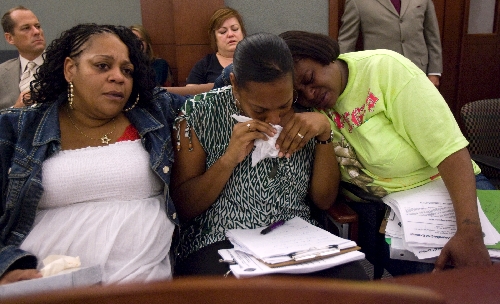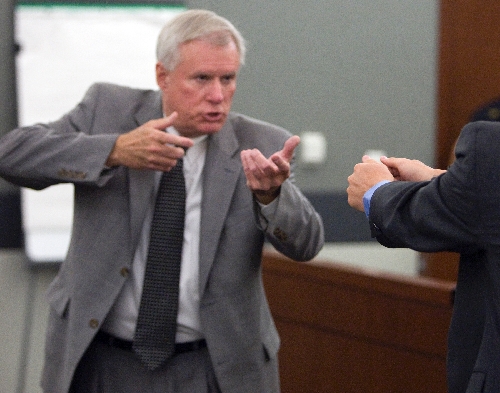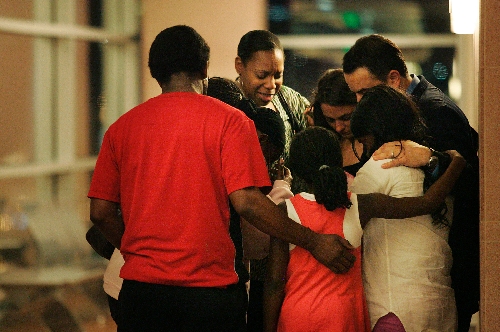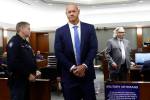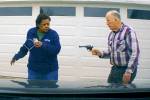Deadly shooting justified, jury rules
A Clark County coroner's inquest jury took 90 minutes Saturday to rule the fatal police shooting of an unarmed man justified, capping two days of pointed questioning and contradictory evidence in one of the more controversial officer-involved shootings in recent history.
Metropolitan Police Department Detective Bryan Yant testified Saturday that he feared for his life when 21-year-old Trevon Cole raised his hands in a shooting stance during the June 11 drug raid. Yet testimony from other officers and physical evidence contradicted his story.
Immediately after the verdict, Sheriff Doug Gillespie announced that all forced-entry warrants, such as the one conducted by Yant's six-member narcotics squad, would be carried out only by SWAT teams until the department reviews its policies.
"I had concerns about some of the policy issues that came up with the Trevon Cole case," Gillespie said.
During Yant's testimony Saturday, prosecutors strongly suggested that he had accidentally pulled the trigger as he kicked open the door to the bathroom where Cole was hiding.
Despite contradictory statements by nearly everyone else who testified, Yant stood by his story that he fired the fatal shot only after Cole stood up, turned and thrust his hands toward Yant as if he had a gun.
"Unfortunately he made an aggressive act toward me. He made me do my job," Yant testified.
Assistant District Attorney Chris Owens noted that the evidence -- such as the position of Cole's body, the downward angle of the bullet through his cheek to his neck, and testimony from fellow officers who did not hear both a door kick and gunshot -- pointed toward an accidental discharge simultaneous with the door kick.
"That version is consistent. Your version is not. How do you explain that?" Owens asked.
Yant was unable to explain the differences.
"I'm not a forensic scientist," he said. "I'm not a physicist. I don't know. That's what I saw."
People connected to the case were stunned by the verdict reached by the seven-member jury, which had six white members and one Hispanic member.
Cole's fiancée Sequioa Pearce, cradling the couple's infant daughter, said she was saddened by the verdict.
"How many people are they going to have to kill?" Pearce said. "I hoped for a different outcome."
Andre Lagomarsino, the attorney who plans to file a lawsuit against the department on the family's behalf, was stunned.
"If the sheriff is saying he's going to change policies, that should tell everybody something -- that it was a bad shoot," Lagomarsino said.
Yant testified that he kicked open the door during the raid and saw Cole squatting in front of the toilet. The flashlight on his AR-15 rifle had just failed, but Yant said there was enough light in the darkened bathroom to identify Cole and his actions.
He said the nearly 300-pound man rose to his feet while moving his hands forward in a shooting motion. Yant said he also saw a black or gray shiny object in Cole's right hand.
"I saw a glimmer or something shiny as he was coming toward me," he said.
After Cole had fallen dead, he was still clutching a yellow tube of lip balm in his left hand. Police found no gun in the bathroom or apartment, although the homicide detective who investigated the incident speculated that Yant might have seen a plastic baggie in Cole's right hand.
A baggie was found next to Cole's body, and bits of marijuana floated in the toilet, according to police.
Much of the evidence contradicted key parts of Yant's story, and unlike previous inquests, where such discrepancies were sometimes ignored, prosecutors used them to grill Yant.
Only one of six officers crammed into the tiny one-bedroom apartment heard Yant give any orders to Cole. The officer who did hear Yant give orders said he didn't hear Yant say anything about Cole's hands.
In the estimation of the medical examiner and homicide detective who investigated the case, Cole turned in Yant's direction while crouched over the toilet. But based on how Cole's body was found, the medical examiner found it highly unlikely that Cole took a step toward Yant, as the detective claimed.
Yant also said he had enough light to see Cole and his movements clearly, yet the senior officer at the scene, Sgt. John Harney, said the apartment was "pitch black."
Earlier in the day, Harney testified about a number of errors leading up to Cole's death.
Harney, who ran the narcotics Street Team 8, testified that the mistakes began with Yant's affidavit seeking a search warrant.
In Yant's affidavit, he mistakenly said Cole had a history of drug trafficking.
Despite having a copy of Cole's California driver's license complete with a physical description and date of birth, Yant confused Cole with a Trevon Cole from Houston and California, who was seven years older, at least 3 inches shorter and 100 pounds lighter.
"You would agree that is sloppiness, at the very least," Chief Deputy District Attorney Christopher Laurent asked.
"No," Harney said, calling it a mistake.
Harney said Yant should have compared the birth dates and physical descriptions of both Trevon Coles to verify the information.
Yant didn't say why he made such mistakes, only acknowledging that they were indeed mistakes and that he had made them.
Laurent repeated the sloppiness theme when asking about the entry into the apartment. The front door needed four hits with the metal battering ram before it opened, which was longer than usual and potentially gave people inside more time to arm themselves or destroy evidence.
"The entry was sloppy," Laurent said.
"If you want to use that adjective," Harney responded.
He added that the delayed entry added just a matter of seconds, and the officers entered more slowly and carefully as a result.
Laurent also pressed Harney on Yant's decision to kick open the bathroom door despite having no backup officer and a dead flashlight.
"Is that safe?" Laurent asked.
"Not if it's pitch black and there's no one with you, no," Harney said.
After the shooting, Harney testified, Yant told him Cole moved toward him with a gun in his outstretched hands as soon as he kicked open the bathroom door.
"He said, 'Sergeant, he came at me,' " Harney said.
After the shooting, Harney was responsible for notifying dispatchers that shots had been fired and a suspect had been wounded. Yet an officer at the scene was told only to ask for an ambulance. Not until three minutes later did Harney pick up a cell phone and tell dispatchers what happened.
Detective Dan Long, the homicide investigator tasked with looking into the case, said it is normal procedure that dispatchers are immediately notified after an officer-involved shooting, but he didn't believe anything malicious took place.
He did say that Yant violated department policy by having the errors in the affidavit, and Yant's squad violated policy by allowing a patrol officer without proper training to tag along during the night raid.
Gillespie said Yant and Harney are both facing internal investigations for possible policy violations related to the raid at Cole's apartment. Yant also must face the department's use of force board, which is standard in all officer-involved shootings.
Lagomarsino said he plans to file a civil rights lawsuit and possibly a civil racketeering lawsuit against the department. He said the issue was "far from over and it hasn't even started yet."
Contact reporter Brian Haynes at bhaynes@reviewjournal.com or 702-383-0281. Contact reporter Lawrence Mower at lmower@reviewjournal.com or 702-383-0440.
Clark County coroner's inquest into Trevon Cole shooting



